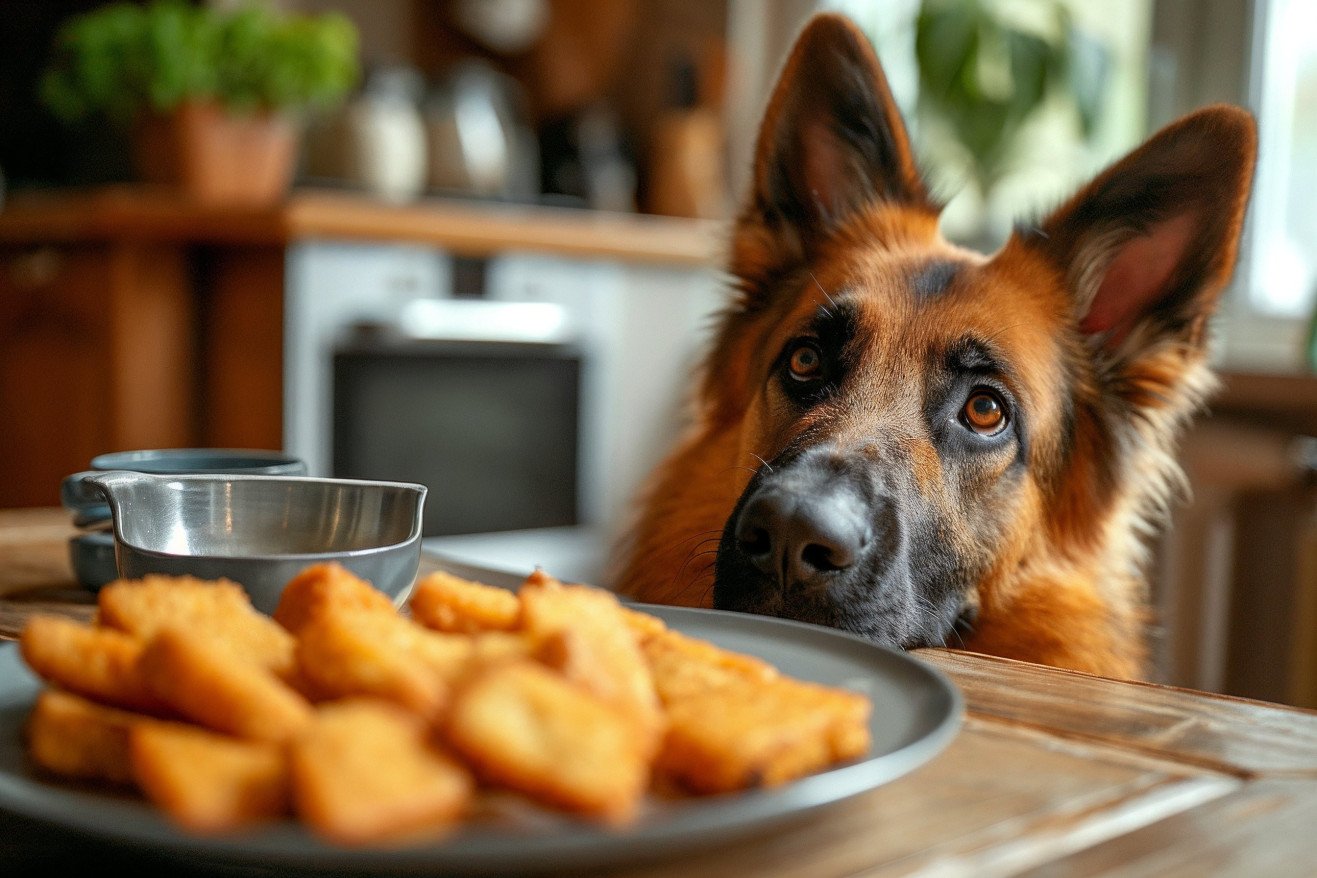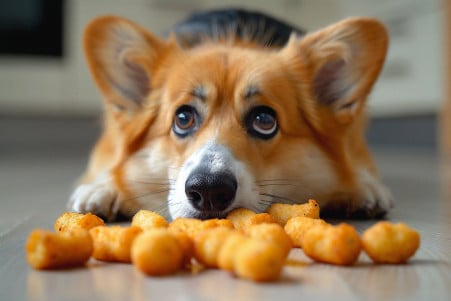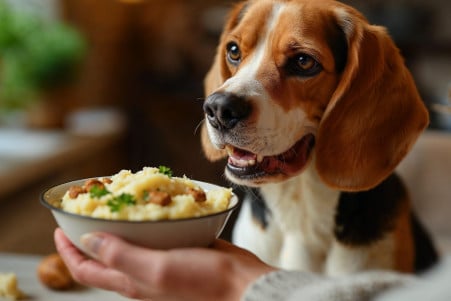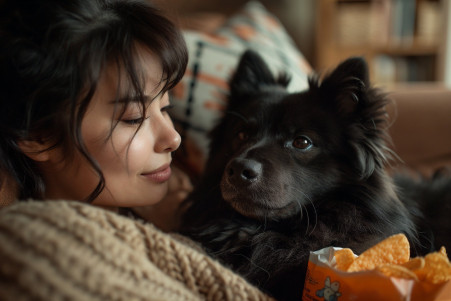Can Dogs Eat Hash Browns? Uncovering the Risks
4 February 2024

It’s hard to resist those golden, crunchy hash browns, but can you give in to the temptation and share them with your dog? The short answer is no, dogs can’t eat hash browns because they are often loaded with salt, fat, and other unhealthy ingredients like onions and garlic, all of which can lead to serious health problems like pancreatitis and digestive distress in dogs.
This article will explore whether or not hash browns can be part of a healthy diet for dogs by looking at information from veterinarians and nutritional experts.
It will also delve into studies by animal nutritionists to find out what dogs need in their diet, why certain human foods like hash browns are bad for dogs, and what happens when dogs eat high-fat foods. By the end of the article, you’ll have all the information you need to make the best choices for your dog’s diet.
Can dogs eat hash browns?
What Do Dogs Need in Their Diet? Essential Nutrients Explained
Like humans, dogs need a variety of essential nutrients to maintain their health. These include proteins, fats, carbohydrates, vitamins, and minerals. Each of these nutrients has a different role in the body. For example, proteins are the building blocks of muscles and tissues, while fats are a source of energy and help with cell structure and function. Carbohydrates are a source of quick energy and help with digestive health, according to PetMD.
Vitamins and minerals are necessary for a range of bodily functions, including bone growth and nerve function. A complete and balanced diet, as defined by the Association of American Feed Control Officials (AAFCO), will provide all of these nutrients without the need for supplements, according to WebMD.
That said, it’s important to make sure that the diet is balanced in terms of the nutrients it provides. If a diet is unbalanced, it can lead to deficiencies or excesses of certain nutrients, which can lead to health problems like obesity or malnutrition. For example, excesses of certain nutrients in a dog’s diet can lead to health problems like heart disease or diabetes, which are common health problems in humans.
To make sure that a dog’s diet is balanced and meets their individual needs, it’s important to work with a veterinarian or a board-certified veterinary nutritionist. These professionals can make recommendations based on the dog’s life stage, breed, and health status that will help ensure that the diet is balanced and meets the dog’s needs while avoiding the risks associated with unbalanced diets.
With the right input, you can create a diet that supports your dog’s health and doesn’t rely on human food, which may not meet their nutritional needs.
Hidden Hazards: Toxic Additives in Dog Food
There are a number of human foods that contain ingredients that are toxic to dogs. For example, onions and garlic are often used in the preparation of hash browns and other foods. These ingredients can cause gastrointestinal upset and can also lead to damage to red blood cells and anemia, which is especially dangerous for dogs.
The ASPCA also lists solanine, which is found in the green parts of tomatoes, as a food that dogs should avoid because it can cause neurological problems.
However, onions, garlic, and solanine are not the only things to worry about. Dogs that have ingested these foods will show signs of toxicity, such as vomiting, diarrhea, and tremors. An article by GoodRx explains that even small amounts of some human foods, such as macadamia nuts or avocado, can be toxic to dogs and cause symptoms that include muscle tremors and vomiting.
If a dog has ingested these toxic foods, it’s important to act quickly. Owners should call a veterinarian or the ASPCA Animal Poison Control Center for immediate help.
To keep our dogs safe, we should make sure that they can’t access these foods and that we’re aware of what’s in the treats we give them. By knowing what human foods like hash browns can contain that can be harmful to dogs, we can help prevent medical emergencies and keep our pets safe.
Managing the Dangers of High-Fat Diets in Dogs
While the risks of high-fat treats for dogs are often forgotten when we indulge in our favorite foods with our pets, the dangers of high-fat diets in dogs are well-documented. Not only can high-fat diets lead to obesity, a common problem in dogs that can lead to a variety of health issues, including pancreatitis, but a study published in PMC found that even lean dogs had concerning metabolic changes when fed a high-fat diet, including increased glucose concentrations and disrupted lipid metabolism, that could lead to obesity and its associated problems.
Not only can high-fat diets lead to obesity, a common problem in dogs that can lead to a variety of health issues, including pancreatitis, but a study published in PMC found that even lean dogs had concerning metabolic changes when fed a high-fat diet, including increased glucose concentrations and disrupted lipid metabolism, that could lead to obesity and its associated problems.
Pancreatitis, which is a painful inflammation of the pancreas, is a common result of eating high-fat foods like hash browns. According to PetMD, symptoms of pancreatitis can include lethargy, abdominal pain, vomiting, and diarrhea. After a dog has had pancreatitis, dietary changes will typically include a low-fat diet to prevent the condition from recurring and to reduce inflammation.
When choosing a diet for your dog, it’s important to look for moderation and balance. One study found that diets should be designed to support lipid metabolism and provide anti-oxidative effects and immunomodulation.
This makes it important to look for the right fat content in dog food, and if you’re ever in doubt, ask your vet for help in finding a diet that’s nutritious and balanced and will support your dog’s long-term health and well-being.
What to Do If Your Dog Eats Something Toxic
If your dog has eaten something toxic, like hash browns, it is important to act quickly. According to a paper published in PMC, clinical signs of food poisoning in dogs include vomiting, diarrhea, anorexia, depression, and in more severe cases, neurological signs such as tremors and seizures. If you think your dog may have ingested a toxic substance, watch for these symptoms closely.
If you suspect food toxicity, PetMD advises that you should only induce vomiting under the supervision of a professional. Call your vet or an animal poison control center like the Pet Poison Helpline immediately for help. They may recommend that you induce vomiting or give your dog activated charcoal to help prevent the substance from being absorbed.
Treatment will depend on the type of toxicity and the severity of the case. Make sure to follow your vet’s instructions to a T, which may include supportive care and medication.
Of course, the best way to deal with food toxicity is to avoid it altogether. Keep your dog safe and healthy by keeping toxic foods away from them and seeking advice from veterinary professionals. You can also avoid food toxicity emergencies by giving your dog healthy, safe treats that are made specifically for dogs.
Healthy Alternatives: Substitutes for Hash Browns for Your Dog
If you’re looking for healthy treats to give your dog, it’s best to avoid hash browns because of the unhealthy ingredients. Instead, opt for healthier alternatives that can help contribute to a healthy diet. Hepper recommends a dog-friendly version of hash browns that are made with sweet potatoes, eggs, and a small amount of coconut oil and then baked to ensure they’re safe.
Sweet potatoes are packed with dietary fiber, vitamins A, C, and B6, and minerals like potassium and manganese, so they’re a healthy option that can help support your dog’s health. In moderation, plain boiled or baked sweet potatoes can be a great treat for dogs and are much healthier than traditional hash browns that are packed with salt and unhealthy oils.
For pet parents who want to make their own treats, Rested Paws suggests that plain boiled potatoes that are cooked thoroughly are another healthy alternative. Cooking the potatoes thoroughly helps break down solanine, a toxic substance found in raw potatoes.
Always talk to your vet before you add any of these or other new foods to your dog’s diet. Your vet can offer personalized recommendations based on your dog’s specific dietary needs to ensure that the treats you give them are both safe and healthy.
What to Feed Your Dog Instead
So, while hash browns may be a delicious breakfast food for humans, they are definitely not something that you should be feeding your dog. As both PetMD and VCA Hospitals have pointed out, the high fat, salt, and toxic onion and garlic content in hash browns can cause a range of health problems for your dog, including obesity, pancreatitis, and anemia.
This is why it is so important for dog owners to stick to a healthy diet that is tailored to their dog’s nutritional needs and to avoid the temptation to feed them human foods that can be harmful. It is also why it is so important for dog owners to work with their veterinarians to make sure that they are feeding their dogs the right nutrients to keep them healthy.
As a responsible pet owner, it is also important to know what is in the food that you are eating and what the potential risks are so that you can avoid accidentally poisoning your dog.
By making sure that you are feeding your dog the right things, you can make sure that they are as healthy and happy as possible. So, make sure that you are taking good care of your furry friend by feeding them the right things, starting with what you put in their bowl.


